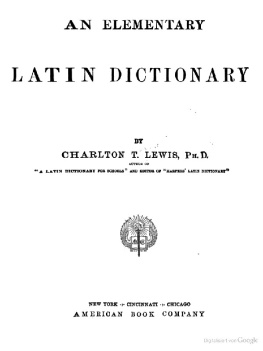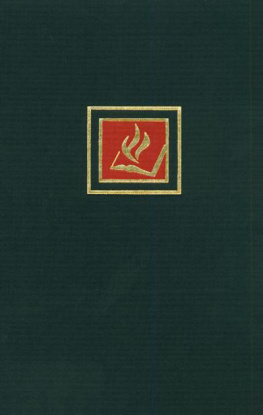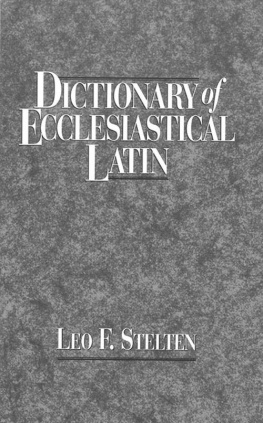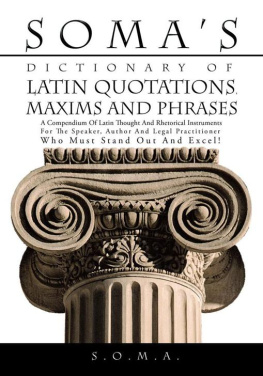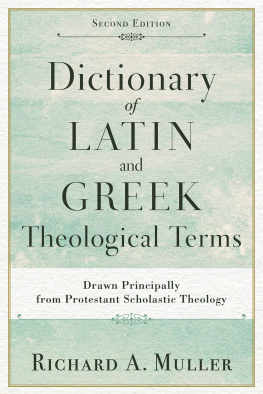A
A. a. as an abbreviation,
for the praenomen Aulus.
for Absolvo, on the voting-tablet of a judge; hence C. calls A littera salutaris.
for Antiquo on a voting-tablet in the Comitia.
a. d. for ante diem.
a.v.c. or a. u. c. for anno urbis conditae, or ab urbe condit.
in the Tusculan Disputations of Cicero probably for Audtor.
(before consonants), ab (before vowels, h, and some consonants, esp. l, n, r, s), abs (usu. only before t and q, esp. freq. before the pron. te), old af, praep. with abl., denoting separation or departure (opp. ad).
I. I. Lit., in space, from, away from, out of.
A. A. With motion: ab urbe proficisci, Cs.: a supero mari Flaminia (est via) , leads: Nunc quidem paululum, inquit, a sole , a little out of the sun: usque a mari supero Romam proficisci , all the way from; with names of cities and small islands, or with domo, home (for the simple abl; of motion, away from, not out of, a place); hence, of raising a siege, of the march of soldiers, the setting out of a fleet, etc.: oppidum ab Aene fugiente a Troi conditum: ab Alesi, Cs.: profectus ab Orico cum classe , Cs.; with names of persons or with pronouns: cum a vobis discessero: videat forte hic te a patre aliquis exiens, i. e. from his house, T.; (praegn.): a rege munera repudiare, from, sent by, N.
B. B. Without motion.
1. Of separation or distance: abesse a domo paulisper maluit: tum Brutus ab Rom aberat, S.: hic locus aequo fere spatio ab castris Ariovisti et Caesaris aberat , Cs.: a foro longe abesse: procul a castris hostes in collibus constiterunt , Cs.: cum esset bellum tam prope a Sicili; so with numerals to express distance: ex eo loco ab milibus passuum octo , eight miles distant, Cs.: ab milibus passuum minus duobus castra posuerunt , less than two miles off, Cs.; so rarely with substantives: quod tanta machinatio ab tanto spatio instrueretur, so far away, Cs.
2. To denote a side or direction, etc., at, on, in: ab sinistr parte nudatis castris , on the left, Cs.: ab e parte, qu , etc., on that side, S.: Gallia Celtica attingit ab Sequanis flumen Rhenum , on the side of the Sequani, i. e. their country, Cs.: ab decuman port castra munita , at the main entrance, Cs.: crepuit hinc a Glycerio ostium , of the house of G., T.: (cornua) ab labris argento circumcludunt , on the edges, Cs.; hence, a fronte, in the van; a latere, on the flank; a tergo, in the rear, behind; a dextro cornu, on the right wing; a medio spatio, half way.
II. II. Fig.
A. A. Of time.
1. Of a point of time, after: Caesar ab decimae legionis cohortatione ad dextrum cornu profectus , immediately after, Cs.: ab eo magistratu , after this office, S.: recens a volnere Dido , fresh from her wound, V.: in Italiam perventum est quinto mense a Carthagine , i. e. after leaving, L.: ab his , i. e. after these words, hereupon, O.: ab simili <*>ade domo profugus, i. e. after and in consequence of, L.
2. Of a period of time, from, since, after: ab hora terti bibebatur , from the third hour: ab Sull et Pompeio consulibus , since the consulship of: ab incenso Capitolio illum esse vigesumum annum , since, S.: augures omnes usque ab Romulo , since the time of: iam inde ab infelici pugn ceciderant animi , from (and in consequence of), L.; hence, ab initio, a principio, a primo, at, in, or from the beginning, at first: ab integro , anew, afresh: ab ... ad , from (a time) ... to: cum ab hor septim ad vesperum pugnatum sit , Cs.; with nouns or adjectives denoting a time of life: iam inde a pueriti, T.: a pueriti: a pueris: iam inde ab incunabulis , L.: a parvo , from a little child, or childhood, L.: ab parvulis , Cs.
B. B. In other relations.
1. To denote separation, deterring, intermitting, distinction, difference, etc., from: quo discessum animi a corpore putent esse mortem: propius abesse ab ortu: alter ab illo , next after him, V.: Aiax, heros ab Achille secundus , next in rank to, H.: impotentia animi a temperanti dissidens: alieno a te animo fuit , estranged; so with adjj. denoting free, strange, pure, etc.: res familiaris casta a cruore civili: purum ab humano cultu solum, L.: (opoidum) vacuum ab defensoribus , Cs.: alqm pudicum servare ab omni facto , etc., II.; with substt.: impunitas ab iudicio: ab armis quies dabatur , L.; or verbs: haec a custodiis loca vacabant , Cs.
2. To denote the agent, by: qui (Mars) saepe spoliantem iam evert it et perculit ab abiecto, by the agency of: Laudari me abs te, a laudato viro: si qu id ei a Caesare gravius accidisset, at Caesar's hands, Cs.: vetus umor ab igne percaluit solis , under, O.: a populo P. imperia perferre , Cs.: equo lassus ab indomito , H.: volgo occidebantur: per quos et a quibus? by whose hands and upon whose orders? factus ab arte decor, artificial, O.: destitutus ab spe , L.; (for the sake of the metre): correptus ab ignibus, O.; (poet. with abl. of means or instr.): intumuit venter ab und, O.Ab with abl. of agent for the dat., to avoid ambiguity, or for emphasis: quibus (civibus) est a vobis consulendum: te a me nostrae consuetudinis monendum esse puto.
3. To denote source, origin, extraction, from, of: Turnus ab Arici , L.: si ego me a M. Tull io esse dicerem: oriundi ab Sabinis, L.: dulces a fontibus undae , V.With verbs of expecting, fearing, hoping (cf. a parte), from, on the part of: a quo quidem genere, iudices, ego numquam timui: nec ab Romanis vobis ulla est spes , you can expect nothing from the Romans, L.; (ellipt.): haec a servorum bello pericula, threatened by: quem metus a praetore Romano stimulabat , fear of what the praetor might do, L.With verbs of paying, etc., solvere, persolvere, dare (pecuniam) ab aliquo, to pay through, by a draft on, etc.: se praetor dedit, a quaestore numeravit, quaestor a mens public, by an order on the quaestor: ei legat pecuniam a filio , to be paid by his son: scribe decem (milia) a Nerio , pay by a draft on Nerius, H.; cognoscere ab aliqu re, to know or learn by means of something (but ab aliquo, from some one): id se a Gallicis armis atque insignibus cognovisse, Cs.; in giving an etymology: id ab re ... interregnum appellatum, L.Rarely with verbs of beginning and repeating: coepere a fame mala, L.: a se suisque orsus , Ta.
4. With verbs of freeing from, defending, protecting, from, against: ut a proeliis quietem habuerant , L.: provincia a calamitate est defendenda: sustinere se a lapsu , L.
5. With verbs and adjectives, to define the respect in which, in relation to, with regard to, in respect to, on the part of: orba ab optimatibus contio: mons vastus ab natur et humano cultu , S.: ne ab re sint omissiores , too neglectful of money or property, T.: posse a facundi , in the matter of eloquence, T.; cf. with laborare, for the simple abl, in, for want of: laborare ab re frumentari , Cs.
6. In stating a motive, from, out of, on account of, in consequence of: patres ab honore appellati , L.: inops tum urbs ab longinqu obsidione , L.
7. Indicating a part of the whole, of, out of: scuto ab novissimis uni militi detracto , Cs.: a quibus (captivis) ad Senatum missus (Regulus) .
8. Marking that to which anything belongs: qui sunt ab e disciplin: nostri illi a Platone et Aristotele aiunt.
9. Of a side or party: vide ne hoc totum sit a me, makes for my view: vir ab innocenti clementissimus , in favor of. In late prose, of an office: ab epistulis, a secretary, Ta. Note. Ab is not repeated with a following pron interrog. or relat.: Arsinon, Stratum, Naupactum ... fateris ab hostibus esse captas. Quibus autem hostibus? Nempe iis, quos , etc. It is often separated from the word which it governs: a nullius umquam me tempore aut commodo: a minus bono, S.: a satis miti principio , L.The poets join a and que, making que; but in good prose que is annexed to the following

